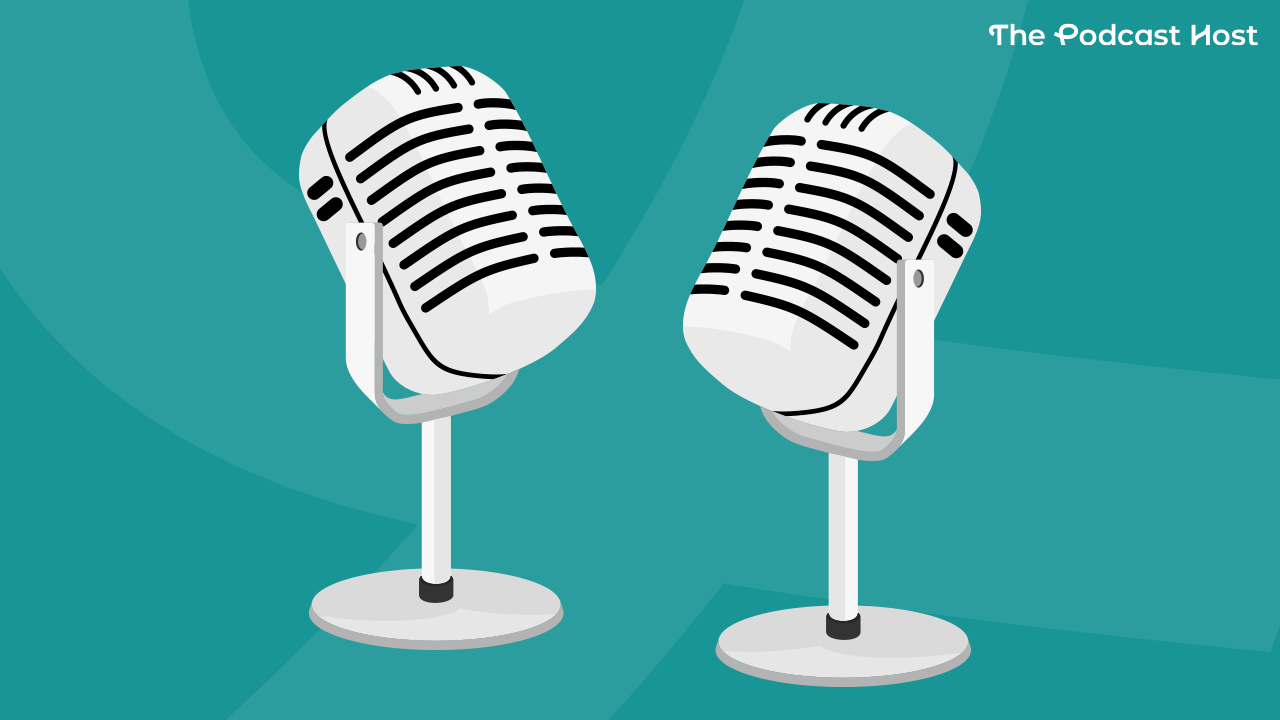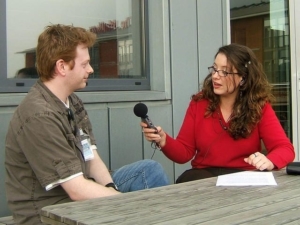9 Ways to Prepare for the Best Podcast Interview You’ve Ever Recorded

Running a great podcast interview is hard. Despite what you hear, interviews are never the ‘easy option’.
I can understand the misconception. It sounds simple: find an expert, get them on the phone and then ask them questions. There’s no need for you to do a thing! Is there?
Well, turns out that getting good content from that expert is far harder than anyone expects. Sure, they know their stuff, but can they deliver it well? Can they stay on-topic, tell a good story, and avoid the waffle? Can you steer them away from the standard, rehearsed sales pitches or background stories? Can you get something different, something dramatic, something funny, or something… just… interesting?
That’s what this article is about – running a good podcast interview, and getting the best material you can. At the end of the day, it’s still down to the interviewee, but there’s a LOT you can do to increase the chances that they’ll deliver.
And in a world of interview show after interview show after interview show…. you have to do something to stand out. So, let’s jump in.
1. Yes, You Do Have to Prepare…
Rule one – don’t flounce into the (virtual) interview room without having done your research. I’ve heard people say:
“Oh, I don’t prepare for an interview because I want to be in the same situation as my listener, asking the basic questions.”
Lazy. Plain bone idle, and finding an excuse for it.
There are… some… people who can get away with this, but they’ve done literally hundreds of interviews in the past and they’ve developed the skills to pull it off. And, even the ones who’ve said it, I suspect it’s often just bluster, covering the fact that they’re as nervous and as pre-planned as everyone else.
So, what should you do?
 2. Pick Guests Based on Their Unique Approach
2. Pick Guests Based on Their Unique Approach
Firstly, don’t just grab anyone off the street. This sounds obvious, but when you’re starting out and desperate to get people on your show, you might be tempted to grab anyone with your topic in their bio.
“Well, I do a marketing show, and this dude has marketing in his job title. Sold!”
That makes for repetition, repetition, repetition… Snore, snore, snore.
The trouble is, there’s always a bank of ‘common wisdom’ in every industry, and after 2 or 3 ‘average’ people in the industry, you’ll start to hear the same stuff, over and over.
Instead, don’t search for people, search for ideas. Read blogs. Trawl social. You’ll be doing this anyway, if you’re good at what you do.
Learn to spot a unique idea, and hone in on that. That’s what your show is going to be about. Not the person themselves. Let’s be honest, your listeners don’t care about them, they just care about the benefits. So, make sure you know exactly what unique idea your guest is bringing to the show.
3. A Good Bio Cuts Ten Minutes of ‘Same Old…’ or ‘WTF?’
Here’s one I got from Michael O’Neal from the Solopreneur Hour. Spend 15 minutes looking up the following:
- Social media handles
- Their standard background – listen to the 1st ten minutes of another podcast they’ve done, or check their ‘About Page’.
- Their current ‘product push’ – a quick check on social usually reveals what they’re selling right now, from a service to a charity.
The aim here is to craft a bio for them, in your own voice, which skips the usual first 10 minutes of “Can you tell the listeners what you do?” If they’re a guest worth their salt, they’ve been asked that a dozen times before, and there’s a good chance many of your listeners have heard it. Cue the skip button…
Even if they haven’t been interviewed, people’s backgrounds are so long and varied that you’re as likely to get a random childhood story (the WTF?!) as something that’s actually relevant to your audience.
Instead, you know your audience, so pick out the elements that are most relevant, that build credibility and that build curiosity. That’s how you get people to stick around.
4. A Good Bio Cuts the Sales Pitch & Builds Reciprocity
Here’s the best part of doing the prep. if you deliver a great bio, which tells people what they do, what their services or products are, and how you can get in touch with them, well the guest says to themselves: “Wow, she’s done my job for me! And she’s told everyone about my stuff! Well, I wanna give them something back.”
You’ve taken the pressure off. They don’t have to lever their brand, or their service, or their product into the interview. So they start to relax, and skip the standard sales pitch, or the rehearsed lines.
They also start to feel like they owe you. If you do something for them, the rule of reciprocity says that they’ll want to do something for you. That means getting their game face on and making an effort.
You’d be surprised how many podcast interviewees just turn up to a show and give the same old, same old… But if you surprise them, help them right away, you’re likely to get more.
5. Prepare a Gentle… and Fun!… Opening
This is via Call Fussman, the master of interviews: find something fun they’re into and start with that.
If your guest mentioned on Twitter that they’ve been out surfing last week, ask how it went. If they talk about playing the trumpet on their About Page, ask how they got started.
Beginning with something fun, something informal, simply lightens the guests’ heart! It’s something they wont often be asked about, and something they’ll enjoy discussing. They’ll lighten up, become happier, be more postive towards you, and all of that makes for a better interview to come afterward.
6. Prepare the ‘Back and Forth’
I mentioned finding that ‘unique idea’ earlier. This is what powers your actual content preparation.
You wont necessarily want to plan the whole interview, start to finish. It’s best to leave a bit of flexibility to delve into any unexpected, relevant and interesting reveals. But, you do want to prepare the ‘big event’ – that’s the unique idea itself.
The reason for this is that with any unique idea, it’s likely something that the guest has refined over time, and it’s likely to be something quite big. So, if you just say: “Well, tell me about…. “ then the guest will launch off into a 10 minute monologue. Not great to start with. Then, add to that the fact that this is often quite undirected, not necessarily very well planned, and your listeners can easily get lost.
Instead, ask the guest in advance for a bullet point breakdown of the ‘big idea’. Exchange an email or two with them about how you’ll guide them through it.
“So, I think my listeners will respond to hearing about this bit first, then this bit, so why don’t you tell that first part, and then I’ll ask you this to prompt the second part.”
That means you’re avoiding a big long monologue, and you’re providing some structure to the idea.
You don’t have to do this for the whole thing, just for the crux of the show, or any other particularly important things you want to cover.
7. Ask for Stories
Simply, ask the guest, in advance, if they have any stories that they know people find interesting or entertaining. That gives you a prompt to ask about them and make sure they’re introduced naturally.
8. Give Warning for any ‘Thinkers’
The other thing to prepare the interviewee for are any ‘on the spot’ thinkers. These are questions like, “What’s your favourite book,” or “What would you tell someone just starting out in this business?”
These are quite high pressure questions, even if they don’t seem so. ‘Favourite’ things define us, and we want to make sure we give a good one. So, it can lead to an awkward pause, some stuttering, or simply a pretty average answer.
And ‘best advice’ questions often just spark ‘same old’ advice, as above. If the guest doesn’t have time to think, they’ll often just trot out the common knowledge of their industry.
“How do you grow your audience in Podcasting?”
“Do you know what Bob, the best thing you can do is to be yourself!”
Zzzzzzzzzzz
Give them these short answer questions in advance though, and interviewees will skip past the first few obvious answers, and come up with their own unique slant. That makes for a far better show.
9. Ask Them: What would make this a home run for you?
Credit to Mr Tim Ferriss, he suggested this question, to be asked ahead of every interview.
What would make this a home run for you?
This is worthwhile for a bunch of reasons. First, it goes back to the reciprocity above. If you give, then your interviewee will give in return.
Second, as Tim says, he wants every interview to be the best of it’s kind. To be the interviewee’s favourite of all time. Because, guess what happens then? They share it!
Next time the interviewee is asked, “Oh you’ve been interviewed? Where can I listen?” you want them to share your interview. Or, if they’re asked for more on their backstory, make your show the best place to find it.
If you can make your interview their favourite interview, then not only does it make for great content, but it makes for content that they’ll share forever.
Any Other Tips on Becoming a Great Interviewer?
If you follow the advice above, you’re already way ahead of the dozens of other interview shows in your niche. And it make a difference, trust me. Listeners have more and more choice, now, and they’re less and less tolerant of ‘average’ content.
Make the effort, and your audience will reward you through engagement, through sharing, and much more.
Next, let’s look into how to run the interview itself. You’ve done the prep, now it’s time to capture the material, and there are a bunch of things you can do to make sure that goes as well as it possibly can.
> Everything you need to know about doing podcast interviews
> Great Podcast Interview Questions
Fancy Making your Interview Editing & Production Easier?
And remember – if you’re running an interview show, we’ve got an app – Alitu – which does the production for you. It’ll take your interview recording, polish it up, add your theme music, allow you to easily add a spoken intro or outro, and then it’ll export and publish it to your Podcast host of choice. You can also edit out any mistakes or side-tracks if you need to!
It gives you more time for the prep, and that’s what you should be doing, rather than fiddling with EQ and compression! We’ve got a 7-day free trial so you can give it a shot right now. Pop over to Alitu.com to try it out!
 2. Pick Guests Based on Their Unique Approach
2. Pick Guests Based on Their Unique Approach